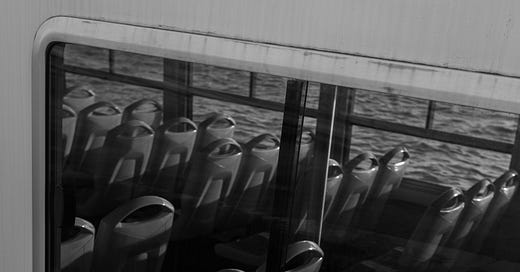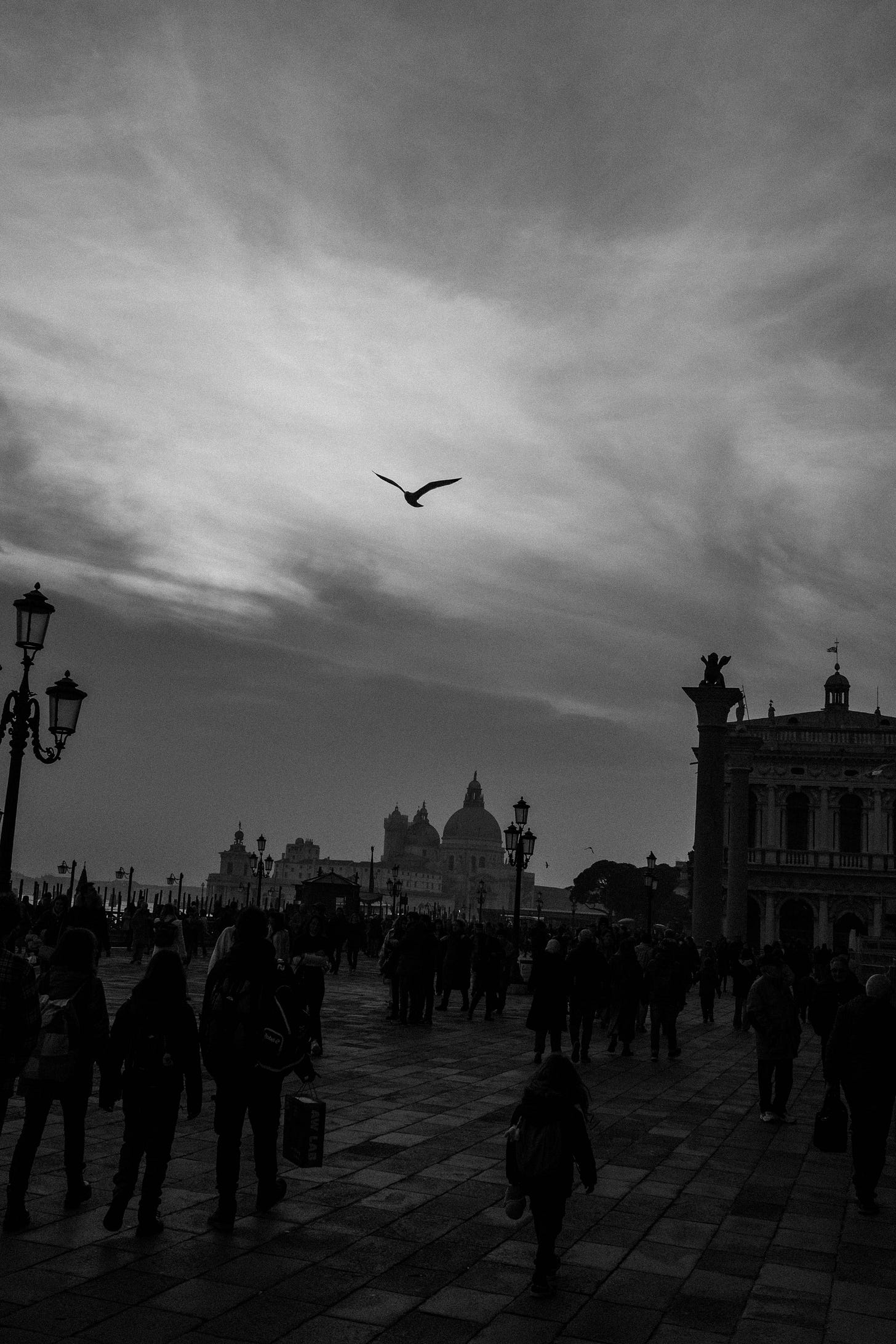On a busy high-speed train to Venice, I am sitting across an older lady with vaporous straw-blond hair and a bottle-green coat. She is wearing orange lipstick and transition sunglasses with a thick tortoise frame. She sits still, a relaxed expression on her face. The sun hits her lenses at regular intervals so her eyes are shaded for a moment before showing again, a vivacious green iris. Next to me is a young couple from Bologna; they are consulting a digital guide of Venice and exchanging notes on bàcari. The lady enters the exchange with the ease of an able dribbler, steals the ball, and asks them something about their imminent visit. I pause the podcast I am listening to and start eavesdropping.
“I was born in Venice,” she says with the hint of pride that always accompanies this statement. “I moved to Florence after I got married, but I am Venetian.” The couple seem surprised, ask the classic follow-up question, “Do you mean Venice-Venice?” and when they see her nodding with a triumphant look in her eyes, they utter a surprised Oh, wow!
Venetians feel rare. They are perceived as a sort of mythological creature, fascinating and irrational at once, their lives running on different clocks and abiding to their own set of physical laws. She knows this all too well, must have had this conversation hundreds of times. She smiles knowingly at their reaction and waits for the next question, eager to be enquired. The general understanding here is that Venice holds its best secrets for itself, and the only way to access them is through their gatekeepers––the locals. She knows this, too.
Predictably, they ask her not for her life story but for suggestions on where to have lunch. They wanted something traditional and fairly priced. The lady suggests a couple of osterie around Dorsoduro and offers precise instructions on how to reach them. They write them down on their phone and thank her. Everybody goes quiet. We are crossing the bridge, water on both sides, the light is blinding and warm. It’s Valentine’s day, but it’s also Ash Wednesday. Carnival is over. I can return from exile.
I alight the train and the lady in the green coat is walking behind me. I slow down and say hello, ask her all the questions the couple didn’t ask her––personal questions about her life. She tells me she likes Florence but misses the lagoon. I tell her that, although I wasn’t born in Venice, I feel exactly the same. “Some of us are water people,” she says. I tell her I was surprised at her sharp memory of toponymies after all these years of living away from Venice. “I come to visit my sister four times a year. Besides, there are things one doesn’t forget,” she says.
Instead, I think of all the things I thought I’d never forget and then did, all the details about all the places I’ve lived in that are now so vague that they require an incredible effort to be brought to the surface. Padova, Bra, Vermont, London ––Hammersmith, Wimbledon, Walthamstow–– and then Sydney ––Glebe and (I have to google it because I don’t recall the name of the other part of town I lived in, which totally proves my point) Coogee. Do I remember Bra’s street names? I used to know the London underground map by heart, cycle through Padova with my eyes closed, drive through the Langhe knowing all the shortcuts. What happens to all this memory, all these details? Where do they go?
I want to ask the lady, but she’s aiming for the vaporetto pier. I wave goodbye to her and start walking. It’s unseasonably warm and I am wearing loafers with no socks. I wish I could remove my coat but I am carrying too many bags. As I march down the Strada Nova, I am hit by another thought, a fragment of a scene from a week prior, when the city was packed with visitors flocking to Venice for Carnival. Rialto. A family of three, lost amidst a never-ending flow of human bodies. I am pushing past the masses on my way somewhere. “Let’s ask someone,” I hear him say. “But who,” she says. “It’s only tourists here.”
I stop at Nobile on my way to buy a pizzetta for the road––a muffin-sized vessel of pizza dough filled with perfectly balanced tomato sauce, a circle of melted mozzarella and, in my preference, an anchovy. I am so hungry I finish it in three bites. Was it good? It was. Does it deserve the cult status it has? Debatable. But it does the job of giving me some energy for the last leg of my journey.
At home, with the washing machine going and the bags unpacked, I start typing these lines:
I want to give directions. I want to be seen.
I also want to remember everything, to stop forgetting. I write so that I have the illusion of control over this inevitable process. Writing is a practice that relieves me from the noise in my head. It also helps me remember facts and details and conversations not just by giving me access to them at a later stage, but also by allowing my brain to actually see them more sharply through the very act of writing them down. It’s as if I don’t know what I’ve done and seen and heard until I’ve written it all down. The feeling of relief is temporary. The mental dust piles up quickly. Soon enough, I will feel like I don’t know what I am thinking once again. Therapy works the same way with me: I need regular disentangling. Writing has been a complementary form of self-inspection (or self-medication?) that has accompanied me since my very first locked diary in primary school.
Walking is another.
These days, with a layer of fog in various degrees of thickness cloaking the city, I go on evening walks to clear my head in between––in good times––furious typing sessions and––in bad times––long stretches of staring to a blank page, or worse, my phone. The time of writing is sparse and shapeless. It contrasts acutely with the domesticated rhythms of daily life, of work. I struggle to make space and protect it from intrusions. I ache to immerse myself in this shapeless time and emerge only when I have remembered everything and forgotten everything else. It feels terribly urgent. Being practical isn’t a primary need right now. Life feels like an imposition. I am resistant to the most basic requests my body puts forth: feed me, go to bed, sit straight. Still, I compensate with walking.
My usual path crosses the Celestia and then follows the walls of the Arsenale, skirts the canal and then passes by the Biennale and the Communist Party on the way to Via Garibaldi, across the Giardini and then to the left, all the way to Sant’Elena. By the time I’ve closed the circle, I’ve had at least a half-decent idea for how to finish a paragraph. Or else, I’ve listened to a full episode of The Writer’s Voice from the New Yorker. Or none of that. Sometimes, it’s just Taylor Swift on repeat. Others, it’s Ex:Re.
One of the songs says:
All adventures, they were in my head
I created life for them
When I return home it’s late and I’m hungry. I know I should make an effort to cook myself something and sometimes I succeed, other times I open a can of chickpeas and blitz them into humus with hot water, lemon and olive oil mixed with harissa. I toast a piadina and then break it into wedges that act as a vehicle for the humus. I dress a mixed salad on the side with more oil and a splash of balsamic. A leafy orange with a thick skin and a gentle sweetness is dessert. Minimal dishwashing. Back to the desk, to that shapeless space.
I want to remember everything. I want to know if that family found their way to wherever it was they wanted to go, if the couple ate at the osteria the old lady in the green coat suggested. I, too, wish I could ask for directions.







I have so enjoyed reading this. Thank you so much for sharing. Are you writing another book?
Beautiful